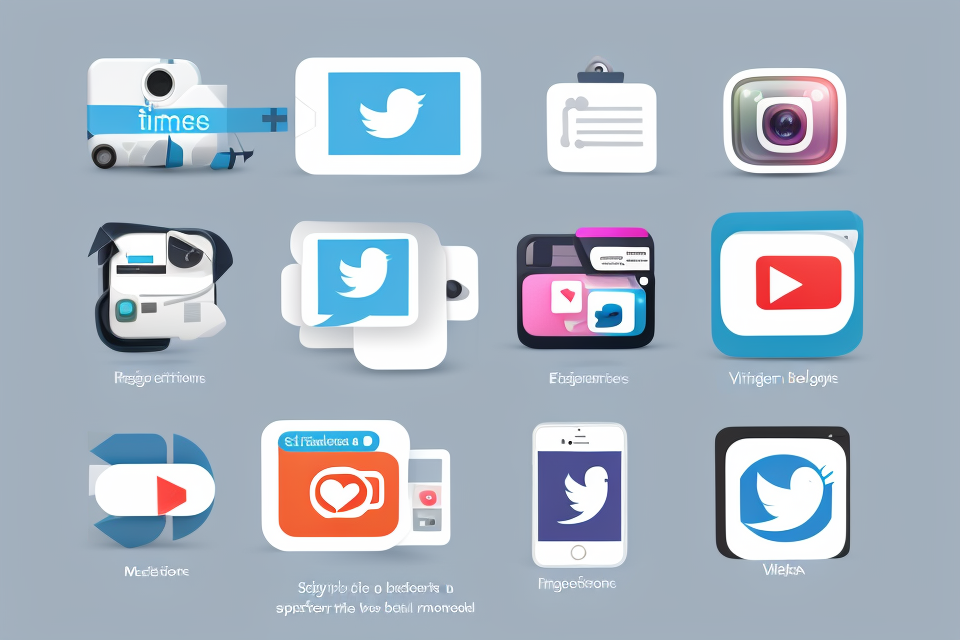In today’s digital age, social media has become an integral part of our lives. It has not only changed the way we communicate but also revolutionized the way businesses operate. With billions of active users worldwide, social media offers a wealth of opportunities for individuals and businesses alike. In this article, we will explore the top 5 benefits of social media for both groups. From building relationships to boosting brand awareness, social media can do wonders for your personal and professional life. So, let’s dive in and discover the magic of social media!
The Power of Social Media
Building Connections
- Connecting with friends and family
- Social media platforms allow individuals to connect with friends and family members who are geographically distant. Through the use of messaging, video calling, and sharing of photos and updates, individuals can stay connected with loved ones regardless of location.
- Expanding professional networks
- Social media can be a powerful tool for expanding professional networks. Platforms such as LinkedIn provide opportunities for individuals to connect with other professionals in their industry, share information and resources, and build relationships that can lead to new job opportunities or business partnerships.
- Joining online communities
- Social media provides a platform for individuals to join online communities based on shared interests or causes. These communities can offer support, resources, and a sense of belonging for individuals who may feel isolated or disconnected. Examples of online communities include support groups for mental health, hobby-based communities, and political activism groups.
Enhancing Communication
In today’s fast-paced world, communication is key. Social media has revolutionized the way we connect and communicate with others. It has opened up new avenues for real-time conversations, sharing information and ideas, and building trust and credibility. In this section, we will explore how social media enhances communication for individuals and businesses.
Real-time Conversations
Social media has made it possible for people to have real-time conversations with others from anywhere in the world. This has broken down geographical barriers and enabled people to connect with others they might not have had the opportunity to interact with otherwise. Social media platforms such as Facebook, Twitter, and Instagram allow users to chat with friends, family, and colleagues in real-time, making it easier to stay connected and up-to-date with each other’s lives.
Sharing Information and Ideas
Social media has also become a powerful tool for sharing information and ideas. People can use social media to share their thoughts, opinions, and experiences with others. This has created a platform for people to learn from each other and gain new perspectives. Social media has also made it easier for businesses to share information about their products and services, as well as to engage with customers and receive feedback.
Building Trust and Credibility
Social media has also become an important tool for building trust and credibility. By sharing information and engaging with customers, businesses can build a positive reputation and establish themselves as a trusted source of information. Social media platforms also provide a way for businesses to showcase their products and services, and to demonstrate their expertise and knowledge in their respective industries. This can help to build trust and credibility with customers, which is essential for building long-term relationships and driving business growth.
Overall, social media has greatly enhanced communication for both individuals and businesses. It has enabled real-time conversations, facilitated the sharing of information and ideas, and provided a platform for building trust and credibility. As social media continues to evolve, it is likely that its role in communication will only continue to grow.
Marketing and Advertising
- Reaching a wider audience: Social media platforms provide a unique opportunity for businesses to reach a broader audience than traditional marketing methods. With billions of active users, social media allows businesses to connect with potential customers around the world, increasing their reach and visibility.
- Targeted advertising: Social media advertising provides businesses with the ability to target specific demographics, interests, and behaviors. This allows businesses to deliver more relevant and personalized advertisements, resulting in higher engagement and conversion rates.
- Measuring success and ROI: Social media platforms offer analytics tools that allow businesses to track the success of their marketing campaigns. This includes metrics such as engagement rate, click-through rate, and conversion rate. By measuring these metrics, businesses can optimize their campaigns for better results and calculate their return on investment (ROI).
In summary, social media provides businesses with a powerful tool for marketing and advertising. By leveraging the platform’s reach, targeting capabilities, and analytics, businesses can create effective campaigns that drive results and improve their bottom line.
Improving Customer Service
Social media has revolutionized the way businesses interact with their customers. One of the key benefits of social media for businesses is the ability to improve customer service. By utilizing social media platforms, businesses can respond to customer inquiries, address complaints and issues, and provide personalized experiences.
Responding to Customer Inquiries
Social media provides businesses with a direct line of communication to their customers. This allows businesses to respond to customer inquiries in real-time, providing quick and efficient customer service. By responding to customer inquiries on social media, businesses can improve customer satisfaction and build trust with their customers.
Addressing Complaints and Issues
Social media also provides businesses with a platform to address customer complaints and issues. By responding to customer complaints on social media, businesses can show that they are willing to listen to their customers and take their concerns seriously. This can help to resolve issues quickly and prevent them from escalating.
Providing Personalized Experiences
Social media also allows businesses to provide personalized experiences for their customers. By using social media to gather information about their customers, businesses can tailor their products and services to meet the specific needs and preferences of their customers. This can help to improve customer satisfaction and loyalty.
Overall, social media provides businesses with a powerful tool for improving customer service. By utilizing social media, businesses can respond to customer inquiries, address complaints and issues, and provide personalized experiences, all of which can help to improve customer satisfaction and build trust with their customers.
Generating Leads and Sales
- Identifying potential customers: Social media platforms can help businesses identify potential customers by providing demographic data, interests, and behaviors. This information can be used to create targeted marketing campaigns that reach the right audience.
- Engaging with leads: Once potential customers have been identified, social media can be used to engage with them through direct messaging, comments, and posts. This allows businesses to build relationships with potential customers and answer any questions they may have.
- Closing sales: Once a lead has been engaged, social media can be used to close the sale. Businesses can use social media to provide special offers, discounts, and incentives to encourage potential customers to make a purchase. Additionally, social media can be used to provide excellent customer service, which can increase customer loyalty and lead to repeat business.
Maximizing Social Media Benefits
Setting Goals
- Identifying objectives
- Clearly defining the purpose of social media presence
- Determining specific goals based on individual or business needs
- Measuring success
- Establishing key performance indicators (KPIs)
- Regularly monitoring and analyzing social media metrics
- Adjusting strategies based on data-driven insights
- Adapting strategies
- Continuously evaluating and refining social media tactics
- Responding to changing trends and audience preferences
- Staying informed about updates and new features on social media platforms
Creating Compelling Content
In today’s digital age, creating compelling content is crucial for individuals and businesses alike. With the vast array of social media platforms available, it’s important to know how to craft engaging posts that will grab the attention of your target audience. Here are some tips to help you create compelling content on social media:
Crafting Engaging Posts
- Use attention-grabbing headlines: The headline is the first thing people will see when they come across your post, so make sure it’s interesting and relevant to your audience.
- Add visuals: Visual content such as images, videos, and infographics can help to break up text and make your posts more engaging.
- Keep it concise: Social media users have short attention spans, so keep your posts short and to the point.
- Use humor or emotion: Humor and emotion can be powerful tools for engaging your audience and making your posts more memorable.
Visual Content
- Use high-quality images: Using high-quality images can help to make your posts more visually appealing and engaging.
- Use images that are relevant to your message: Make sure the images you use are relevant to the message you’re trying to convey.
- Use graphics and charts: Graphics and charts can help to make complex information more easily understandable and engaging.
Storytelling
- Use a narrative structure: Stories are a powerful way to engage your audience and make your posts more memorable. Use a narrative structure to tell a story that is relevant to your message.
- Use anecdotes: Anecdotes can help to make your posts more relatable and engaging.
- Use emotion: Emotion can be a powerful tool for engaging your audience and making your posts more memorable. Use stories that evoke emotion to help your audience connect with your message.
Utilizing Analytics
In order to maximize the benefits of social media for individuals and businesses, it is essential to utilize analytics effectively. By tracking performance, identifying trends, and optimizing campaigns, you can gain valuable insights that can help you achieve your goals.
Tracking Performance
One of the most important benefits of social media analytics is the ability to track performance. By monitoring metrics such as likes, shares, comments, and followers, you can determine which types of content are resonating with your audience and which are not. This information can help you adjust your strategy to better engage with your audience and achieve your objectives.
Identifying Trends
Another benefit of social media analytics is the ability to identify trends. By analyzing data over time, you can spot patterns in consumer behavior and adjust your strategy accordingly. For example, if you notice that your audience is more engaged with videos than with written content, you may want to create more video content to increase engagement.
Optimizing Campaigns
Finally, social media analytics can help you optimize your campaigns. By analyzing data on the performance of your campaigns, you can identify what is working and what is not. This information can help you adjust your strategy to achieve better results. For example, if you notice that your audience is more engaged with certain types of content, you may want to create more of that content to increase engagement.
Overall, by utilizing social media analytics, individuals and businesses can gain valuable insights into their audience and optimize their social media strategy to achieve their goals.
Engaging with Influencers
- Building relationships
- Establishing mutually beneficial connections
- Gaining access to a broader network
- Cultivating trust and credibility
- Leveraging influence
- Tapping into an influencer’s existing following
- Amplifying reach and visibility
- Enhancing brand authority and legitimacy
- Expanding reach
- Penetrating new markets and demographics
- Generating leads and conversions
- Increasing social proof and customer loyalty
Maintaining a Strong Presence
In order to maximize the benefits of social media for both individuals and businesses, it is essential to maintain a strong presence on the various platforms. This involves several key elements, including consistency in posting, active engagement, and the implementation of social media policies and guidelines.
Consistency in Posting
One of the most important aspects of maintaining a strong presence on social media is consistency in posting. This means creating a content calendar and sticking to it, so that followers know when to expect new content. It is also important to vary the types of content posted, such as text, images, and videos, in order to keep followers engaged and interested.
Active Engagement
Another key element of maintaining a strong presence on social media is active engagement with followers. This means responding to comments and messages in a timely manner, as well as engaging with other users by liking and sharing their content. By doing so, businesses can build relationships with their followers and foster a sense of community around their brand.
Social Media Policies and Guidelines
Finally, it is important for businesses to have clear social media policies and guidelines in place. This includes establishing rules for employee behavior on social media, as well as guidelines for the types of content that can be posted. By having these policies in place, businesses can ensure that their social media presence is consistent and professional, which can help to build trust and credibility with followers.
The Future of Social Media
Emerging Trends
- Augmented Reality (AR)
- AR allows users to experience a more immersive and interactive digital environment by overlaying digital content onto the real world.
- For businesses, AR can be used to showcase products in a more engaging way, providing customers with a more realistic view of products before purchase.
- For individuals, AR can enhance social media experiences, such as by adding interactive elements to photos and videos.
- Voice Search
- Voice search is becoming increasingly popular as users find it more convenient and natural to use their voice to search for information.
- For businesses, optimizing for voice search can help to improve visibility and accessibility for users who prefer to use voice commands.
- For individuals, voice search can make it easier to find information and access services without having to type.
- Influencer Marketing
- Influencer marketing involves partnering with individuals who have a large following on social media to promote products or services.
- For businesses, influencer marketing can be an effective way to reach a wider audience and build brand awareness.
- For individuals, collaborating with influencers can provide opportunities for exposure and growth.
Ethical Considerations
- Privacy concerns: As social media platforms continue to grow in popularity, there is a growing concern about the amount of personal information that is being shared on these platforms. Many users are worried about the data that they are sharing with these platforms and how it is being used. There is a need for social media companies to be transparent about their data collection and usage policies to reassure users that their privacy is being protected.
* **Misinformation and fake news**: With the rise of social media, there has been an increase in the spread of misinformation and fake news. This can have serious consequences, especially during elections, when false information can be used to manipulate public opinion. Social media companies need to take responsibility for the content that is being shared on their platforms and take steps to prevent the spread of misinformation. - Data security and protection: Social media platforms store a vast amount of personal data, including sensitive information such as financial data and health information. This data is a valuable commodity and can be targeted by hackers and cybercriminals. Social media companies need to invest in robust security measures to protect this data and prevent data breaches.
It is important for social media companies to address these ethical considerations and take steps to protect the privacy and security of their users. By doing so, they can build trust with their users and ensure that social media remains a safe and secure platform for everyone.
Opportunities for Growth
- Expanding into new markets
- Social media platforms offer businesses the opportunity to reach a wider audience and expand into new markets. This can be achieved by creating targeted advertising campaigns and using analytics to track the performance of these campaigns. Additionally, businesses can use social media to connect with customers in different regions and learn about their needs and preferences.
- Diversifying content
- Social media allows businesses to diversify their content and reach different audiences. For example, businesses can create videos, infographics, and other types of content that appeal to different age groups and interests. This can help businesses to reach a wider audience and engage with customers in new ways.
- Utilizing new features and tools
- Social media platforms are constantly updating their features and tools, and businesses can take advantage of these updates to improve their marketing strategies. For example, social media platforms offer analytics tools that can help businesses track the performance of their campaigns and make data-driven decisions. Additionally, businesses can use new features such as live streaming and shoppable posts to engage with customers and drive sales.
FAQs
1. What are the benefits of social media for individuals?
The benefits of social media for individuals include:
- Connecting with friends and family: Social media platforms like Facebook, Instagram, and Twitter allow individuals to connect with their loved ones and stay updated on their lives.
- Building relationships: Social media can help individuals build relationships with people they might not have had the opportunity to interact with in person.
- Sharing information: Social media is a great way for individuals to share information and knowledge with others.
- Personal branding: Social media can be used as a tool for personal branding and career development.
- Entertainment: Social media platforms offer a variety of entertainment options, such as videos, music, and games.
2. What are the benefits of social media for businesses?
The benefits of social media for businesses include:
- Marketing: Social media is a powerful marketing tool that allows businesses to reach a wider audience and promote their products or services.
- Customer engagement: Social media provides businesses with a platform to engage with their customers and respond to their queries and feedback.
- Brand awareness: Social media can help businesses increase their brand awareness and build a positive reputation.
- Research: Social media can be used as a research tool to gather insights about customers, competitors, and industry trends.
- Networking: Social media can help businesses connect with other businesses and potential partners.
3. Is social media safe for children?
The use of social media by children can be safe if they are supervised and taught how to use it responsibly. Parents should monitor their children’s activity on social media and educate them about online safety and privacy.
4. Can social media be addictive?
Yes, social media can be addictive for some individuals. It is important to set limits and take breaks from social media to avoid excessive use and its potential negative effects on mental health.
5. Can social media be used for political activism?
Yes, social media can be a powerful tool for political activism. It allows individuals and groups to share their ideas and opinions, mobilize support, and advocate for change. However, it is important to use social media responsibly and respectfully, and to be aware of the potential risks and consequences of online activism.



